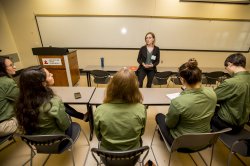Over the last several years, we’ve worked with students on a variety of research topics & projects. Whether we’re leading the project or just providing information for a student’s research paper, we’re always happy to be involved!
Projects:
Fall 2023: Sustainability Assessment for Bloomfield College
Our Fall 2023 intern used the framework established in 2020 from our own assessment which was the first phase of the Facilities Sustainability Plan.
She evaluated the facilities-specific operations at the Bloomfield College campus to determine what data is available, what data is needed, and establish a baseline dataset. Recommendations were made for process improvements which tie in with the overall goals and metrics outlined in the Facilities Sustainability Plan.
Summer 2023: Green Team – various topics
Facilities sponsored a 2023 Green Team through the PSEG Institute for Sustainability Studies. The team reviewed the Facilities Sustainability Plan and worked on strategies to help us make progress on five of our 17 sustainability goals. Their work included examining our irrigation practices in different areas of campus by testing soil quality and infiltration rate, and programing a robot to take readings of ambient air temperature and humidity levels; investigating the possibility of replacing battery-powered fixtures with hard-wired fixtures in restrooms; making recommendations for new recycling infrastructure and signage across campus to reduce contamination; developing a collection and donation program for items that would normally be discarded by students during residential move-out each May; creating promotional materials for the Fill it Forward program which is meant to encourage the use of reusable water bottles and our bottle filling stations on campus.
Our sponsorship of the team and the team’s work relate directly to the following Facilities Sustainability Plan Goals:
- 01-2: Reduce potable water consumption and annual potable water costs.
- 02-1: Reduce waste generation.
- 02-2: Increase waste diversion from landfill.
- 03-2: Build partnerships to increase student, faculty, and staff awareness of campus sustainability
- 05-1: Increase use of automated systems to reduce irrigation’s demand for potable water.
Watch the team’s final presentation.
Spring 2021: Lighting Retrofits for Russ Hall
In the spring of 2021, our intern looked for potential energy savings in Russ Hall, one of our oldest buildings. She chose to focus on efficient lighting because most of the light fixtures in the building are either incandescent or fluorescent and utilize manual switches. She calculated how much energy could be saved by changing all fixtures to LED and by changing manual switches to occupancy sensors so lights in areas such as laundry rooms and custodial closets wouldn’t be left on. Additionally, she researched appropriate lighting levels and color temperature for the different types of spaces in the building.
Her work revealed that by making the recommended replacements, we could cut our energy consumption in Russ Hall from 165,560 kWh to 60,780 kWh, saving us 129,708 lbs./64.9 tons of CO2 annually, and that the project cost would break even in just under 3.5 years.
These recommendations were forwarded to Facilities leadership and came to fruition in 2023 yielding more savings than originally predicted.
Spring 2020: ArcGIS StoryMap of Green Initiatives & Infrastructure:
In the spring of 2020, PSEG ISS Green Building Ambassadors unveiled their Green Building Initiative & Infrastructure Story Map.
Facilities is thrilled to see this map come to life, highlighting the green features on campus!
Fall 2019: Reducing Recycling Contamination
During the fall 2019 semester, Montclair State’s student chapter of the USGBC revamped the recycling signage in the CELS building. Additionally, they held tabling events in the lobby to engage students, faculty, and staff. The primary topics of discussion were how we recycle on campus and what individuals can do to improve their own recycling practices to reduce the amount of contamination that finds its way into the recycling bins.
A waste audit performed at the end of the semester showed an improvement in building occupants’ recycling habits compared to previous waste audits in the building. The auditors reported that “trash in the recycling was somewhat reduced, while food, other compostables (napkins), and liquids were greatly reduced.”
Summer 2019: Water Conservation
Facilities sponsored a 2019 Green Team through the PSEG Institute for Sustainability Studies. Our team completed a study of water usage in on-campus residence buildings. Their calculations showed that by replacing old faucet aerators and shower heads with newer, more efficient models, the University could save over 39 million gallons of water and over $300,000 over a five year period! Additionally, the team designed educational materials to inform residents about water conservation and encourage them to reduce their consumption.
Research Topics:
Facilities has helped students researching the following topics:
- Recycling
- Food waste
- Composting
- Green Building & LEED Certification
- Stormwater pollution & green stormwater infrastructure
- Biophilic architecture
- Furnishings made from recycled materials
Need an Internship or Project in Sustainability?
Consider applying for an internship through the PSEG Institute for Sustainability Studies Green Teams summer program.
If you’re looking for information for a class project or your capstone project, we’re happy to help! Send us an email.
